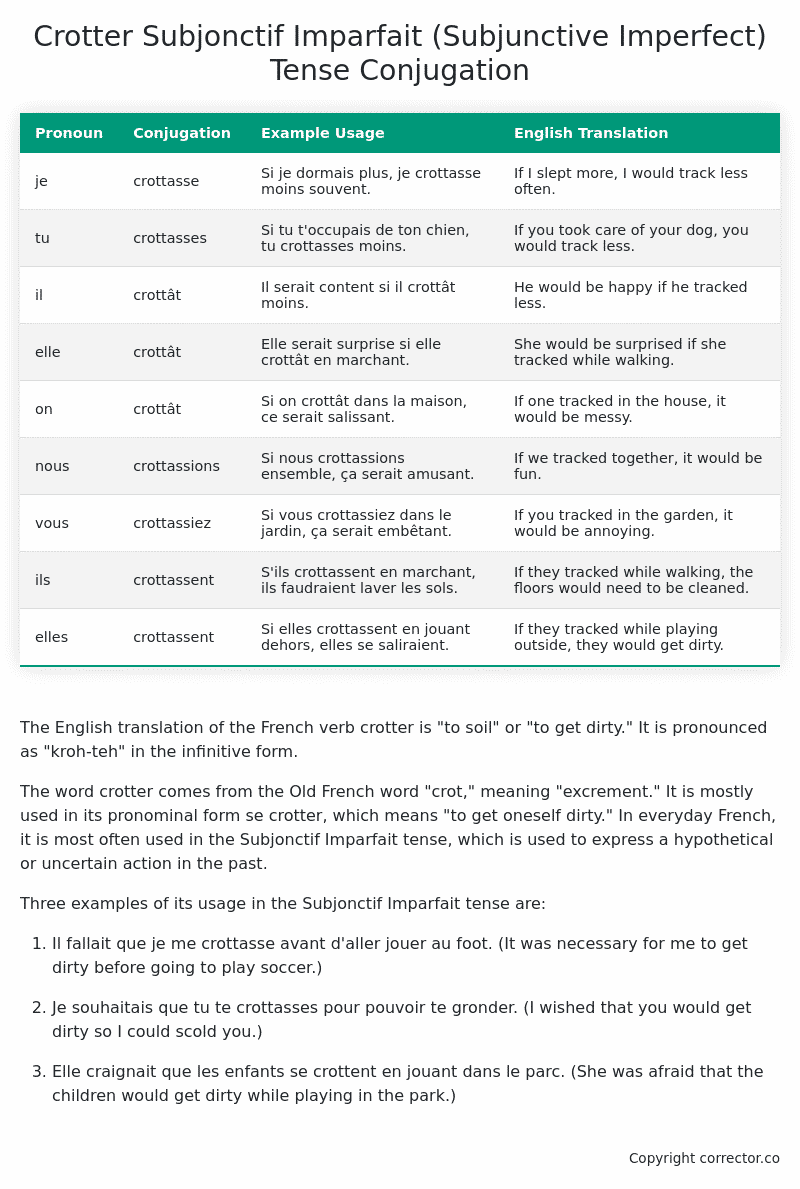Subjonctif Imparfait (Subjunctive Imperfect) Tense Conjugation of the French Verb crotter
Introduction to the verb crotter
The English translation of the French verb crotter is “to soil” or “to get dirty.” It is pronounced as “kroh-teh” in the infinitive form.
The word crotter comes from the Old French word “crot,” meaning “excrement.” It is mostly used in its pronominal form se crotter, which means “to get oneself dirty.” In everyday French, it is most often used in the Subjonctif Imparfait tense, which is used to express a hypothetical or uncertain action in the past.
Three examples of its usage in the Subjonctif Imparfait tense are:
-
Il fallait que je me crottasse avant d’aller jouer au foot. (It was necessary for me to get dirty before going to play soccer.)
-
Je souhaitais que tu te crottasses pour pouvoir te gronder. (I wished that you would get dirty so I could scold you.)
-
Elle craignait que les enfants se crottent en jouant dans le parc. (She was afraid that the children would get dirty while playing in the park.)
Table of the Subjonctif Imparfait (Subjunctive Imperfect) Tense Conjugation of crotter
| Pronoun | Conjugation | Example Usage | English Translation |
|---|---|---|---|
| je | crottasse | Si je dormais plus, je crottasse moins souvent. | If I slept more, I would track less often. |
| tu | crottasses | Si tu t’occupais de ton chien, tu crottasses moins. | If you took care of your dog, you would track less. |
| il | crottât | Il serait content si il crottât moins. | He would be happy if he tracked less. |
| elle | crottât | Elle serait surprise si elle crottât en marchant. | She would be surprised if she tracked while walking. |
| on | crottât | Si on crottât dans la maison, ce serait salissant. | If one tracked in the house, it would be messy. |
| nous | crottassions | Si nous crottassions ensemble, ça serait amusant. | If we tracked together, it would be fun. |
| vous | crottassiez | Si vous crottassiez dans le jardin, ça serait embêtant. | If you tracked in the garden, it would be annoying. |
| ils | crottassent | S’ils crottassent en marchant, ils faudraient laver les sols. | If they tracked while walking, the floors would need to be cleaned. |
| elles | crottassent | Si elles crottassent en jouant dehors, elles se saliraient. | If they tracked while playing outside, they would get dirty. |
Other Conjugations for Crotter.
Le Present (Present Tense) Conjugation of the French Verb crotter
Imparfait (Imperfect) Tense Conjugation of the French Verb crotter
Passé Simple (Simple Past) Tense Conjugation of the French Verb crotter
Passé Composé (Present Perfect) Tense Conjugation of the French Verb crotter
Futur Simple (Simple Future) Tense Conjugation of the French Verb crotter
Futur Proche (Near Future) Tense Conjugation of the French Verb crotter
Plus-que-parfait (Pluperfect) Tense Conjugation of the French Verb crotter
Passé Antérieur (Past Anterior) Tense Conjugation of the French Verb crotter
Futur Antérieur (Future Anterior) Tense Conjugation of the French Verb crotter
Subjonctif Présent (Subjunctive Present) Tense Conjugation of the French Verb crotter
Subjonctif Passé (Subjunctive Past) Tense Conjugation of the French Verb crotter
Subjonctif Imparfait (Subjunctive Imperfect) Tense Conjugation of the French Verb crotter (this article)
Subjonctif Plus-que-parfait (Subjunctive Pluperfect) Tense Conjugation of the French Verb crotter
Conditionnel Présent (Conditional Present) Tense Conjugation of the French Verb crotter
Conditionnel Passé (Conditional Past) Tense Conjugation of the French Verb crotter
L’impératif Présent (Imperative Present) Tense Conjugation of the French Verb crotter
L’infinitif Présent (Infinitive Present) Tense Conjugation of the French Verb crotter
Struggling with French verbs or the language in general? Why not use our free French Grammar Checker – no registration required!
Get a FREE Download Study Sheet of this Conjugation 🔥
Simply right click the image below, click “save image” and get your free reference for the crotter Subjonctif Imparfait tense conjugation!

Crotter – About the French Subjonctif Imparfait (Subjunctive Imperfect) Tense
Formation
Common Everyday Usage Patterns
Interactions with Other Tenses
Subjonctif Présent
Indicatif Passé Composé
Conditional
Conditional Perfect
Summary
I hope you enjoyed this article on the verb crotter. Still in a learning mood? Check out another TOTALLY random French verb conjugation!


